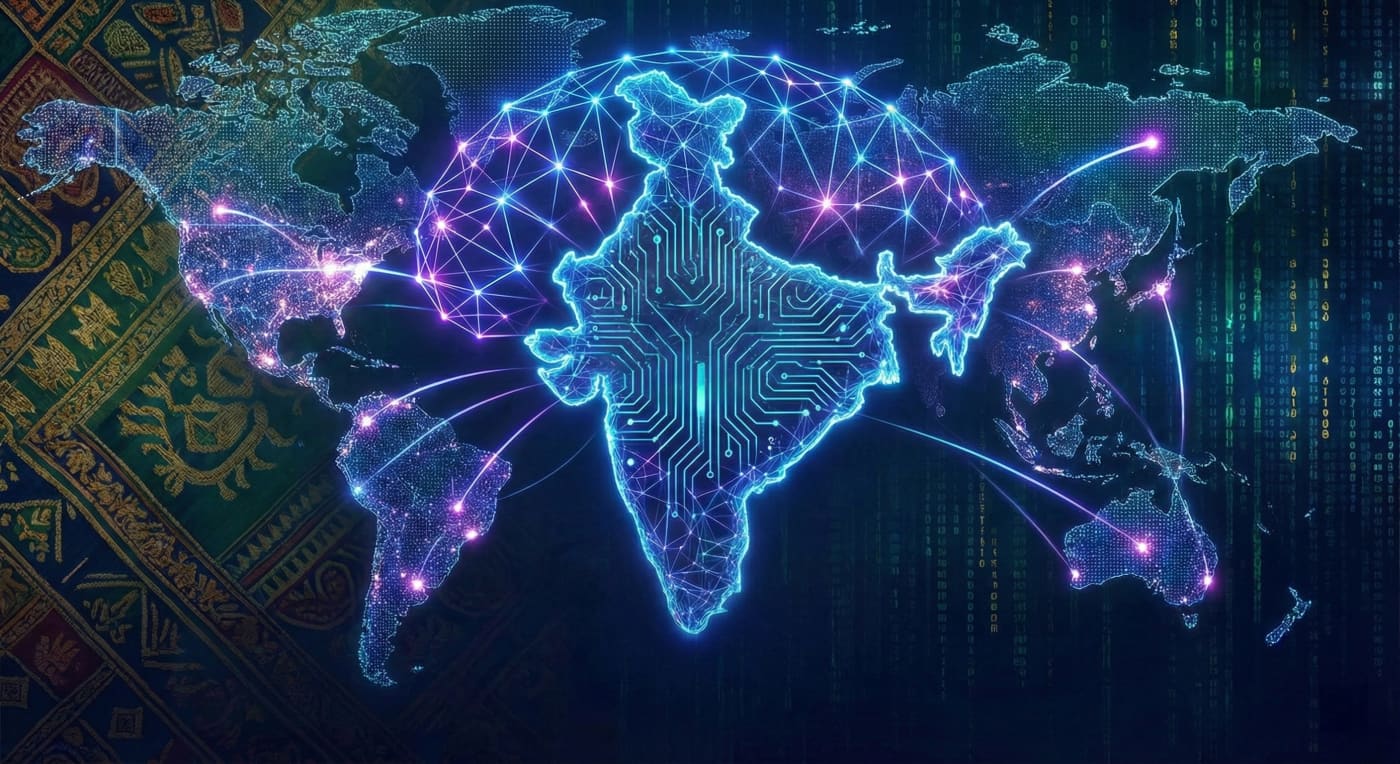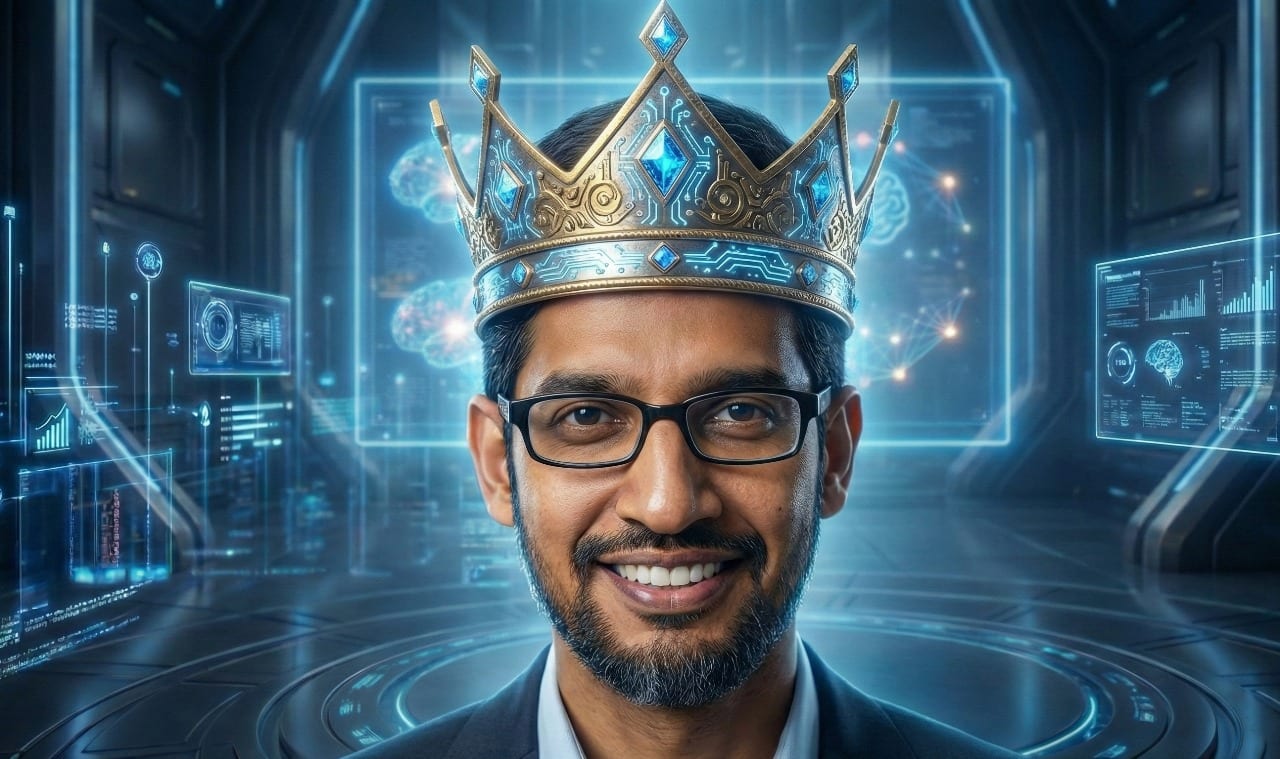
AI Edge Rewind 2025 | The year India stopped talking about AI and started building it
In 2025, artificial intelligence stopped being a future story for India and became an infrastructure one.
From billion-dollar AI data centres and mounting power constraints to free AI bundles, trillion-parameter ambitions, regulatory pushback and a quiet rewrite of Indian IT, the year revealed how deeply AI is embedding itself into the country’s economy and governance.
In this year-end edition of AI Edge, we bring together the top stories that shaped India’s AI moment in 2025… the bets, the bottlenecks, and the debates that will define what comes next.
1. The great Indian AI data centre boom
India is fast becoming the world’s data centre hub. From being the biggest market for tech talent to now the region for userbase farming – global tech and AI giants took notice in 2025.
Microsoft is investing $17.5 billion to build AI and cloud infrastructure. Google announced a $15-billion gigawatt-scale AI data centre campus in Vizag
TCS is investing around $6.5 billion over the next 5-7 years to build 1 GW data centre capacity; Reliance Industries is starting a $11 billion data centre joint venture, among others
The opportunity is stark: India generates nearly 20% of the world’s data but hosts just 3% of global data centre capacity. That gap is opening the door for large-scale investments from US tech majors.
State governments, meanwhile, are racing to cash in these investments—rolling out dedicated policies, incentives and discounted land parcels to secure a share of the data centre boom.
We unpack what goes into building an AI data centre.
2. India’s AI boom meets power reality
India’s AI ambitions are scaling at breakneck speed, but so is its appetite for power.
From Google’s $15-billion, gigawatt-scale AI campus in Visakhapatnam to IndiaAI Mission’s fast-expanding GPU clusters, the country’s push for sovereign AI is colliding with hard constraints around electricity, cooling, water and climate
As electricity demand surges and sustainability concerns rise, India’s AI moment is increasingly defined by how it powers its machines—not just how fast it builds them. Find out more
3. Who really wins from free AI?
What began as generous “free” AI subscriptions from Perplexity-Airtel, Google-Jio and OpenAI is fast turning into a deeper debate about data, consent and digital sovereignty.
As millions of Indians gain access to premium AI tools, experts warn that global tech firms may be quietly harvesting multilingual, culturally rich Indian data to train their models, only to sell those products back at scale
With India’s data protection rules still rolling out, the rush of AI-telco bundles raises uncomfortable questions: are users truly giving informed consent, who is liable when data flows abroad, and is India fuelling a new form of “neo-colonisation” in the age of artificial intelligence? Find out more
4. How Google flipped the AI script in 2025
At the beginning of 2025, it almost seemed like Google was losing the AI race to nimbler rivals. A shaky start to the generative era left critics calling it slow, defensive, and behind the curve. It was also facing a threat of a breakup by the US government.
Fast forward to today and the narrative has flipped. Not only is the tech giant still in one piece, but it has mounted a strong comeback this year. From powerful frontier models like Gemini 3 topping major AI benchmarks, breakout products like NotebookLM and Flow, and headline-grabbing features like Nano Banana image generation and Veo 3 video creation that suddenly everyone is talking about, Google is finally playing offence
How did Google put the pieces together for its comeback and engineer its AI resurgence? It all stems from the company's full-stack AI strategy, long-term bets finally paying off, its pre-training and post-training prowess, and the comeback of co-founder Sergey Brin. Read our deep dive
5. Market doubts rise, AI spending doesn’t
As US markets wobbled on fears of an AI bubble, a three-way partnership between Microsoft, Nvidia and Anthropic showed that the world’s most powerful tech firms are still betting billions on artificial intelligence.
From $30 billion in cloud commitments to chip, model co-design and deeper financial ties, the deal captures AI’s emerging “circular economy,” where cloud giants, chipmakers and model builders are increasingly locked together
Whether this heavy spending marks the foundation of the next computing era or a risky leap ahead of monetisation is one of the defining questions of the year in AI. More on that here
6. AI builders will shape future geopolitics, says Yoshua Bengio
Countries that invest in building their own AI systems will gain a geopolitical advantage in the future, Yoshua Bengio, widely regarded as one of the godfathers of artificial intelligence, told us in an interview at the World Economic Forum in Davos earlier this year.
Bengio urged governments to incentivise for-profit companies to work on AI safety
He also said that existing global safety nets will not be sufficient to address major labour market disruptions caused by artificial intelligence systems.
7. AI’s ouroboros moment
As 2025 closes, AI finds itself in an uneasy loop, training on the very content it creates.
With AI-generated text flooding the web, researchers warn of “model collapse”, where systems lose accuracy, originality, and human nuance by learning too much from synthetic data
From global labs debating watermarks and provenance tagging to Indian startups racing to curate clean, human-made datasets under the IndiaAI Mission, the year revealed a central tension: scale versus authenticity. Go deeper
8. Inside BharatGen’s 1 trillion parameter AI model
It may be a trillion-parameter model, but it is designed to shrink.
After securing approval from the IT ministry to develop a one-trillion-parameter AI model, Bharat Gen's EVP Rishi Bal told us that the organisation plans to distil the system into domain-specific models for law, agriculture and finance.
Rishi described the mega-model as a “mother system” that will enable the creation of lightweight applications, such as legal assistants or farm advisory tools, in regional languages
To build India-specific datasets, the not-for-profit plans to partner with publishers to digitise archives, crowdsource annotators, and undertake similar efforts.
9. India works on global AI safety benchmarks
India has made key contributions over the years to the global AI policy dialogue—through platforms such as the Global Partnership on Artificial Intelligence and the G20—and aims to carry that tradition forward at the upcoming IndiaAI Impact Summit 2026.
The government is working on an AI Safety Commons, which will essentially be a repository of AI use cases for the Global South; benchmarking and evaluation parameters for AI developers and so on, IIT Madras professor Balaraman Ravindran told us
10. India’s 2-year journey to deepfake regulation
From the 2023 Rashmika Mandanna controversy to October 2025, it has been a long journey toward India’s first deepfake regulation.
A couple of months ago, the Indian government introduced draft amendments to the IT Rules, 2021, proposing additional compliance requirements for creators generating and platforms hosting “synthetically generated information”
However, the move has drawn criticism from various quarters, with many calling for a relook at the scope of the proposed amendments. Critics argue that the draft, in its present form, targets not just the harmful uses of AI—such as deepfakes—but also legitimate creative avenues.
11. AI funding in overdrive
In the world of dealmaking and AI, Emergent, the vibe coding platform founded by former Dunzo co-founder Mukund Jha, has emerged as one of the hottest companies around.
Sources told us that Emergent is raising over $60 million from Khosla Ventures and SoftBank, as it compounds at breakneck speed
This came months after we reported that over a dozen AI startups were negotiating new rounds with Peak XV Partners, Elevation Capital and others…And weeks after, we heard that more than half a dozen AI firms were preparing to raise from Accel, Prosus and others.
12. AI in Indian fintech and broking, with limits
From broking platforms to fintech startups, AI is steadily moving closer to India’s financial decision-making stack, but always with guardrails on.
Firms are using AI to analyse portfolios, personalise insights, automate operations and improve customer interfaces, while stopping short of stock-picking, unsupervised advice or full autonomy
Amid regulatory scrutiny and trust concerns, AI is emerging less as a disruptive shortcut and more as a careful upgrade, turning hype into function without crossing lines regulators are not ready to redraw. Unpacking this here.
13. AI labelling mandate testing content creators
This year, the Indian government said that content created using AI must be disclosed with a label—a rule that is now tripping up creators.
Navigating a new maze of regulations, creators say the labelling requirement is disrupting workflows, increasing operational costs, and raising fears that their content could be misinterpreted as false or unreliable.
AI labels that cover up to 10% of the screen are also slowing brand activity
Influencer marketing agencies are now building internal checklists, with every Reel required to go through an “AI touchpoint review” to assess whether voices, visuals, backgrounds, or transitions involve generative tools.
14. Indian AI developers draw global giants
India's booming AI developer community attracted prominent global AI players like OpenAI and Anthropic, who are setting up local offices and expanding operations to leverage the country's vast talent pool and accelerate the adoption of their offerings.
These moves come amid intensifying rivalry with tech giants such as Google, Microsoft and Meta, all of whom are investing heavily to tap into one of the world's largest developer bases
OpenAI's Srinivas Narayanan spoke to us about making the company's offerings more affordable for developers in India and how its ecosystem is designed to attract the next wave of AI developers from the country and beyond.
Microsoft's Jay Parikh also told us that India's developer community is a key investment area as the country raced past the United States to become the largest source of open-source contributors on GitHub
15. AI rewrites the operating model of Indian IT
A quiet rewrite, not a sudden break. What looks like incremental change across quarterly updates is, in fact, a structural shift in how Indian IT operates.
For decades, growth followed a simple formula: hire more people, add delivery layers, and scale revenue. That people-led engine built global champions but is now being dismantled
Over the last few quarters, large IT firms have begun operating differently. AI, automation, and platform-led delivery are replacing headcount expansion as the primary drivers of scale.
Executives now speak of productivity gains, AI factories, and agentic systems rather than fresher hiring or bench growth
The takeaway: Indian IT is no longer optimising for size. It is optimising for output, with intelligence as the new production layer.
16: Back office renaissance
A quiet reversal is underway. Once seen as labour-heavy cousins of IT services, BPM firms are now emerging as AI-led technology operators.
Integrated technology operations, long dominated by IT firms, are increasingly being executed by BPM-origin players such as Genpact, EXL, and Firstsource Solutions
Over the past four quarters, AI and agentic automation embedded directly into workflows have driven faster growth, rising technology-led revenues, and stronger investor confidence compared with many IT peers.
The takeaway: By sitting closest to day-to-day operations, BPMs are turning AI into revenue faster than traditional IT services firms
17. AI-fueled crypto rally gets reality check
In a world going gaga over memecoins and Dogecoin ETFs, talking about fundamentals and AI-blockchain integration can make a crypto investor feel smarter than others – only it’s still more vibes than value.
Unlike memecoins, AI tokens are backed by real use cases, integrating machine learning and automation within decentralised ecosystems
NEAR, ICP, FET, TAO, and Render are some of the popular AI tokens
But, as we close 2025, investors are watching out for use cases that would scale; projects with clear utility and strong technology to hold ground. Others are expected to fade away. We take a closer look here
Was this newsletter forwarded to you? You can sign up for the AI Edge here
December 27, 2025



















